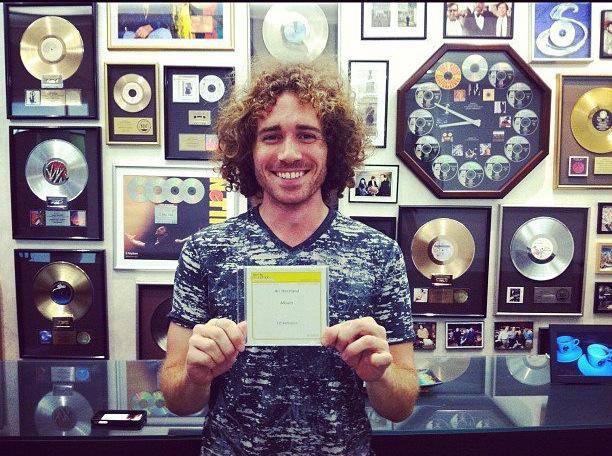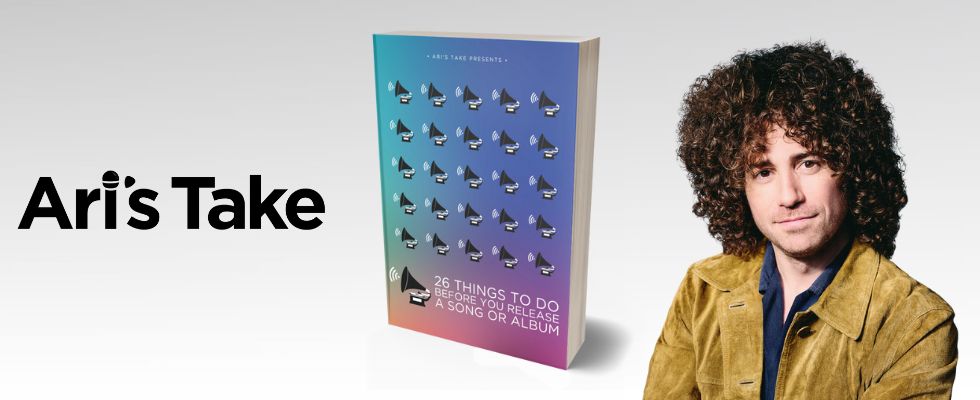I originally wrote this for ASCAP.
I’ve recorded 4 full length albums, 1 EP, many singles (see YouTube), two live albums and countless demos. I’ve sat in on famous A room sessions to home studio sessions and I’ve worked with Grammy winners to students and everyone in between.
The most important thing you need to know going into the recording process is: It doesn’t matter who works on it, it matters what the finished product sounds like.
So many bands get approached by “big time” producers with their long list of “big time” credits who explain they will give you the privilege to work with them – for a fee of course. An ENORMOUS fee at that. Lucky you.
Don’t take the bait.
You can get virtually anyone to work on your project and record in virtually any studio in the world if you can pay for it. Where you record and with whom you record does not guarantee stardom. It doesn’t even necessarily give you a leg up. So much more goes into a bands’ success these days than just quality.
+Your Music Doesn’t Matter
Preproduction
This is an incredibly important aspect of your recording process. Maybe even the most important step. Working out as much as you possibly can before you step into the studio (on the clock) will save you a tremendous amount of money. You want to rehearse the studio version of your songs to the point where you could play them in your sleep. Get the arrangements locked in. There should be no debate about how to get out of the bridge when you’re tracking. Have your guitar/keyboard player and singer record scratch tracks to the click (of the exact BPM you will use for the song). Write the tempo BPMs down for every song, so when the engineer opens the first song on day one all you have to do is tell him “this song is called ‘Maybe’ and the BPM is 132.” Don’t waste time figuring out tempos in the studio. You should figure out what program the studio is using (Pro tools, Logic) and if you can, record the scratch tracks in that program so all the engineer has to do is dump in those tracks. You’ll most likely do much of the preproduction with your producer before hitting the studio.
Producer
This is the most important person for your project. When you’re seeking out producers, the first check you need to make is the gut check. Don’t hire a producer before having an informal meeting, lunch, jam, whatever. This person will be with you every step of the way. You guys need to get along. You need trust. You need to know that she GETS your project, your songs, your band. Figure out what her favorite albums are. Listen to some past records she’s produced. Some producers will even offer to track one test song with you from start to finish for free. If you’re on the fence about this producer, take her up on it – even if it’s just in her home studio. It’s worth it to get a feel for how she works and to see how well you vibe. You don’t want to step into a $700 a day studio and start fighting with this producer. Not only will it mess up the overall vibe, you’ll waste a ton of money!
The Studio
Similar to the producer, it doesn’t matter how successful the previous projects that were recorded in this studio are. It matters if you like the sound of the albums. Sure, it’s a fun tidbit to include in the album’s press release, but at the end of the day it matters what your album sounds like. I can’t stress this enough. I recommend getting a studio with a great sounding live room to record drums at a minimum. You don’t need a state of the art studio to track vocals. You need a good vocal mic and an isolation booth. That’s it. But you do need a good sounding live room to get good sounding drums. The vibe of the studio is also very important as are the house engineers who will be the first hands on your project. While your drummer is tracking, you’re going to be hanging out in the control room for hours on end. You want to make sure this room is comfortable. It should be bursting with energy to encourage inspiration, but also should be calming enough when you need some relaxation (or have a lounge that you can retreat to).
The ways studios get bands to block out multiple days, if not weeks for their sessions, are by offering top notch gear, a vibey space and great amenities (coffee, fridge, Pacman, pool tables, couches, Nintendo). If you want to experiment with amps and guitars then it may be worth it to find a studio with a plethora of these choices. Similarly with drums, pianos, rhodes, organs, etc.
Get the mic and outboard gear list (most studios will have all of this info on their website) and do some research. Discuss what gear and mics are best for your project.
The studio’s console is also a selling feature. Most people prefer Neve consoles. Because of Pro Tools and Logic, most sessions aren’t actually mixed through the consoles anymore, but it’s nice to run as many of the instruments through the console for warmth and vibe. It was fun to say most of the instruments on my album were run through the same console that John Lennon’s “Imagine” was run through. But don’t spend additional money to stay in that studio just for the console.
If your producer has a decent home studio with a few excellent mics and great outboard gear and you’re comfortable with all the gear your band has, then all you need to do is spend a couple days in an expensive studio to track drums, then you can move to your producer’s home studio to track everything else. Your vocals are going to sound nearly identical run through a U47 at your producer’s home as they would in the studio.
Engineer
This is the person who runs Pro Tools/Logic. She sets up all the mics (after discussion with the producer). Some engineers will tune the drums. Good engineers will have the session open and ready (BPM’s plugged in along with the scratch tracks) and have the room setup with all mics you’ll need for that day before you arrive. She’ll know the ins and outs of the studio (how to blow into the Mario cartridge to get it to work), the trick to get the pizza oven to not burn, make the best cup of coffee and which amps need just the right tap on the left corner to get the sound you need. Some producers always work with the same engineers. On big sessions there will be the producer (who usually won’t setup any mics or touch Pro Tools), her favorite engineer to run Pro Tools and setup mics, the studio’s house engineer (to be the project engineer’s assistant), studio interns to make coffee and wash dishes, and various drum/guitar techs. Small sessions will have just a producer (who covers everything above and more – except dishes. That will then be the drummer’s job, clearly).
Mixing Engineer
Do not overlook the importance of your mixing engineer. Great mixing engineers can take a pile of shit and turn it into Top 40 gold. You know the saying, “you can’t polish a turd?” Well great mixing engineers actually can. I’ve used the same mixing engineer for my last 3 records. I think he’s the best in the world (and happens to be a great friend – and quite reasonable. Paul Marino). The difference from what the recording sounds like before he mixes to after is astounding! In my opinion, getting the right mixing engineer is almost more important than the producer, engineer and studio.
Mastering Engineer
My last record was mastered by Bernie Grundman and before that Scott Hull and before that Greg Calbi. These are big names. And they cost a lot. I didn’t hire them to master my records because they’ve won Grammys (they have) or because they have countless platinum records on their walls (they do). I honestly couldn’t care less about that. I hired them to master my records because THEY ARE THE BEST AT WHAT THEY DO.
In the world of mastering there are only a handful of greats out there. And mastering is incredibly important – even though many of you reading this I’m sure have no idea what mastering is. It’s one of the most elusive parts of the recording process (and most expensive). But mastering can dictate the overall vibe and feel of a record. So it’s important.
Make sure you leave a budget for mastering. These heavy weights charge $2-4K per album (for indie projects). It’s worth it. Some mastering engineers offer deals at slow times of the year. It may be worth calling them and asking if they do and when. Some will give you discounts depending on your situation. They’ll send you a rate, but you can start the conversation from there. Some will budge, some won’t. You don’t need the best in the world, but get someone great. Similarly, listen to the records they have mastered and see if it’s appropriate for your project. For instance, Calbi’s co-worker (down the hall at Sterling Sound), Ted Jensen is also one of the greats, however, he masters in a complete opposite style than Calbi. Calbi’s records feel like a lavender massage, Jensen’s feel like a knock out punch to the face. It’s all what you’re going for.
How to Find These People
Like I said previously, you can get virtually anyone to work on your record if you pay them. Start by gathering up your favorite all-time records (of the last 20 years, as before that those guys may be out of the game… or dead). Also gather up your favorite local records. Get a full credits list for all these records. You’re mainly looking for the producer as all other people will be worked out with you and your producer (you don’t want to lock anyone else in before you lock in your producer). You can find most credits on Allmusic.com. The local records you may actually need to Facebook them and ask. They’ll be flattered.
+Be A Supportive Member of Your Music Community
Once you have this list of producers, track down contact info (Google search should be sufficient) and send them a pitch email. Start with your first choices and work down the list. You should have one great sounding demo of your best new song (don’t send a shitty board feed from a live concert). Spend a couple hundred bucks to record a demo if you need to. Include a SoundCloud link in your pitch email to these people (don’t attach the mp3). Open the email with SPECIFIC praise for their past projects. Ask them if they would be willing to work with you and what their rates are for a 10 song album (or whatever). Again, this will start the conversation. If they say “$10,000 is my rate for 10 songs and I have hookups at studios and engineers to get us good deals on the rest,” don’t be afraid to write back and tell them your exact recording budget and ask him if he can be flexible. No sweat off your back if you give him $15,000 to handle everything (studio, players, engineers) or give him $10,000 and have to pay each other person/studio individually (if you trust him).
They will pitch you their ideal rate for an indie record. Don’t be scared off by the high price tag. If they pitch you $20,000, but you only have $15,000 budgeted for the entire record feel free to write back and see if they will work with you for $10,000. Don’t worry about insulting them. If they don’t have any projects right now, they will consider your counter offer. But remember, always have a meeting with them first before you agree to anything. Ask if they would consider tracking a test song too!
Having a great album can bring you to the next level of your career. But once you have the album mastered, your work has only just begun.
+How I Got 250 To My Debut CD Release
+Booking Your Own Tour: A How-To Guide
+How I Raised $13,544 In A Month (On Kickstarter)
+Pimp Out Your CD Release


















